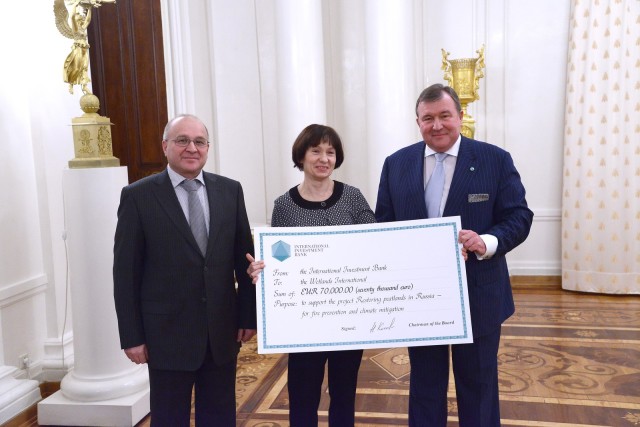IIB provides grant for project to restore peatlands in Russia in cooperation with Wetlands International and KfW

Today, over one million hectares of Russia’s European territory are drained and abandoned peatlands, which pose a serious risk of peat and forest fires. The problem could be solved by the conservation and restoration of disturbed peatlands. In this respect, the International Investment Bank (IIB), expanding its practice of environmental responsibility and promoting sustainable development in its member states, provided a grant for the project “Restoring Peatlands in Russia – for fire prevention and climate change mitigation”. The programme is implemented by the Wetlands International, a global not-for-profit organisation dedicated to the conservation of wetlands.
On December 8, 2016, Chairman of the IIB Board, Nikolay Kosov, presented a symbolic cheque for EUR 70 000 to Irina Kamennova, the Wetlands International’s Russia Programme Coordinator, during the reception on the occasion of the 106th IIB Council Meeting in the Reception House of the Russian Foreign Ministry in Moscow. The project is financed by the German Federal Ministry for the Environment, Nature Conservation, Building and Nuclear Safety through the development bank KfW. It is jointly implemented by Wetlands International, the Michael Succow Foundation, Greifswald University and the Institute of Forest Science of the Russian Academy of Sciences in co-operation with the Russian Ministry of Natural Resources and Environment and regional authorities.
IIB’s grant will finance the project’s second phase to restore peatlands in Russia. Funds will be used for rewetting of areas, where ecosystems have been disrupted by economic activity and which are located in several regions of the European part of Russia (Vladimir, Nizhny Novgorod regions). They play an important role in water regulation of vast territories in the Volga river basin and the well-known Meshchera wetlands region of Central Russia.
“Targeted use of our resources, in particular in the form of environmental grants, follows the mission and goals of the IIB, which is looking for a balance between environmental protection and economic development of its member states, as well as to improve the quality of life of their populations. I am convinced that promotion of environmental activities is an effective deed both economically and morally. It is also important for us to participate in the project with the German partners, namely KfW,” – said N. Kosov.
“IIB’s grant for the Russia Programme of Wetlands International represents both a high appraisal of the work already done and support for our future plans. We are pleased that the Bank is assisting us in our efforts to implement innovative technologies to restore wetland ecosystems and considers it as one of the important issues on the global environmental agenda as well as a possibility for targeted support for sustainable development of Russia,” – responded I. Kamennova.
Social and environmental responsibility is noticeably becoming a priority feature of the activities of the relaunched IIB. In 2015, the Bank adopted Environmental and Social Impact Assessment Guidelines with corresponding criteria for selecting investment projects. Starting last year, the IIB is regularly providing grants for environmental programmes, such as funding for the protection of animal species in Mongolia and Vietnam, including in cooperation with the World Wide Fund for Nature (WWF), and for the development of the Water Risk Filter – WWF’s flagship online tool for water monitoring. The Bank pays special attention to water-related problems – the IIB Chairman has addressed the Budapest Water Summit 2016 and the meeting of the High Level Panel on Water.
Reference
Wetlands International is a global not-for-profit organisation dedicated to the conservation and restoration of wetlands, their resources and biodiversity through research, information exchange and conservation activities worldwide. Global and regional programmes are supported by government agencies, foundations and private sector groups. Wetlands International’s network of 18 regional and national offices facilitate activities in over 120 countries.


